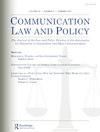A Cheerleader, a Snapchat, and a Profanity go to Supreme Court but the Punchline in Mahanoy Isn’t Funny
IF 0.2
Q4 LAW
引用次数: 0
Abstract
Abstract In Reno v. ACLU and Packingham v. North Carolina, the U.S. Supreme Court ruled that government-enacted restrictions on online speech must pass strict scrutiny review. Even so, efforts to compel and restrict speech appearing in private venues like social media continue to expand in scope and number at both the state and federal level. We first explore Mahanoy Area School District v. B.L. in the context of student speech cases before discussing how the decision destroys the traditional boundary of the schoolhouse gate for the regulation of student speech. It does so despite the fact that the cheerleader’s profane messages would have been protected expression in any nonschool situation. We then argue that Mahanoy, despite being an individual win for the cheerleader, illustrates how the Court continues to wrestle with traditional applications of the First Amendment to internet speech. We argue that the decision has the regulation of internet speech following a path similar to the regulation of broadcast speech.一个啦啦队队长、一个Snapchat和一句脏话上了最高法院,但Mahanoy的Punchline并不好笑
摘要在雷诺诉美国公民自由联盟和帕金汉诉北卡罗来纳州案中,美国最高法院裁定,政府颁布的对网络言论的限制必须通过严格的审查。即便如此,在州和联邦层面,强制和限制言论出现在社交媒体等私人场所的努力在范围和数量上都在继续扩大。我们首先在学生言论案件的背景下探讨了Mahanoy地区学区诉B.L.案,然后讨论了该判决如何破坏了监管学生言论的校舍大门的传统边界。尽管啦啦队队长的亵渎性信息在任何非学校的情况下都会得到保护,但它还是这样做了。然后,我们认为,尽管Mahanoy是啦啦队队长的个人胜利,但它说明了法院如何继续与第一修正案对互联网言论的传统应用作斗争。我们认为,该决定使互联网言论的监管遵循了类似于广播言论监管的路径。
本文章由计算机程序翻译,如有差异,请以英文原文为准。
求助全文
约1分钟内获得全文
求助全文
来源期刊
CiteScore
0.60
自引率
33.30%
发文量
7
期刊介绍:
The societal, cultural, economic and political dimensions of communication, including the freedoms of speech and press, are undergoing dramatic global changes. The convergence of the mass media, telecommunications, and computers has raised important questions reflected in analyses of modern communication law, policy, and regulation. Serving as a forum for discussions of these continuing and emerging questions, Communication Law and Policy considers traditional and contemporary problems of freedom of expression and dissemination, including theoretical, conceptual and methodological issues inherent in the special conditions presented by new media and information technologies.

 求助内容:
求助内容: 应助结果提醒方式:
应助结果提醒方式:


